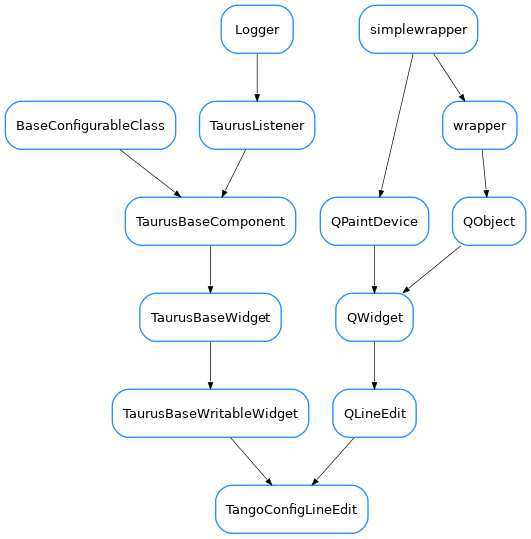TangoConfigLineEdit

- class TangoConfigLineEdit(qt_parent=None, designMode=False)[source]
Import from
taurus.qt.qtgui.panelas:from taurus.qt.qtgui.panel import TangoConfigLineEdit
- autoApply
whether autoApply mode is enabled or not.
- Returns:
True if autoApply is enabled. False otherwise
- Return type:
- forcedApply
whether forcedApply mode is enabled or not.
- Returns:
True if forceApply is enabled. False otherwise
- Return type:
- getValue()[source]
This method must be implemented in derived classes to return the value to be written. Note that this may differ from the displayed value (e.g. for a numeric value being edited by a QLineEdit-based widget, the displayed value will be a string while getValue will return a number)
- model
Returns the model name for this component.
- notifyValueChanged()[source]
Subclasses should connect some particular signal to this method for indicating that something has changed. e.g., a QLineEdit should connect its “textChanged” signal…
- Parameters:
args – arbitrary signal parameters (ignored in this basic implementation)
- postAttach(*, key='')[source]
reimplemented from
TaurusBaseWritableWidget. The key argument is there for API compatibility, but it is ignored byt the current implementation
- setModel(model, **kwargs)[source]
Sets/unsets the model name for the given key. If key is MLIST, a model is set for each name in the model sequence, new model keys are automatically added to the object’s
modelListattribute and the corresponding models are attached using those keys. The new keys are of the form(MLIST, i)whereiis the index of the corresponding model name in the model sequence.
- setValue(v)[source]
This method must be implemented in derived classes to provide a (widget-specific) way of updating the displayed value based on a given attribute value
# noqa: DAR401
- Parameters:
v – The attribute value
- writeValue()[source]
Writes the value to the attribute, either by applying pending operations or (if the ForcedApply flag is True), it writes directly when no operations are pending
It emits the applied signal if apply is not aborted.
- Parameters:
forceApply (bool) – If True, it behaves as in forceApply mode (even if the forceApply mode is disabled by
setForceApply())